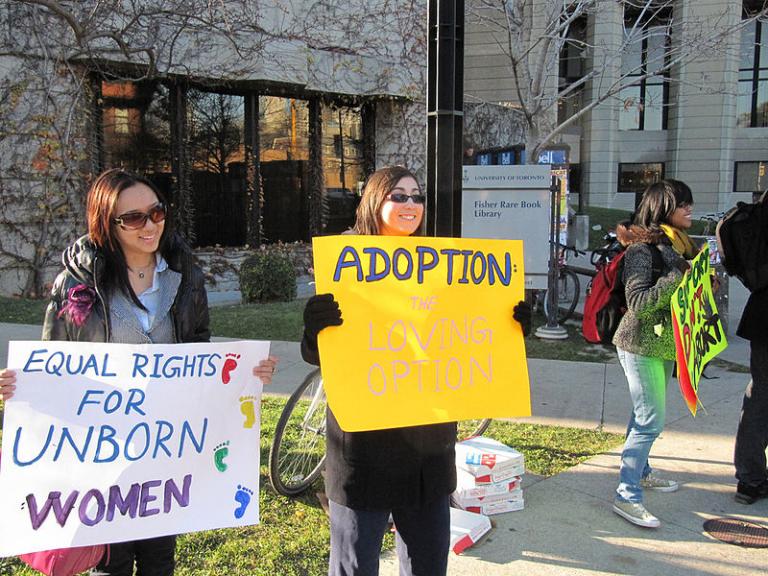Is there a place in the Democratic Party for pro-life voters? It’s a question that’s been fiercely debated of late, especially among religious voters who are critical of Donald Trump but reluctant to vote for a pro-choice candidate. According to Charlie Camosy, Fordham University ethicist and a former board member of Democrats for Life of America (DFLA), the answer is “no.” In a February opinion piece for the New York Post, provocatively titled “The Democratic Party Is Telling Millions of Pro-Lifers to Get Out,” Camosy argued that “[a]nything even hinting that abortion is less than good now violates party orthodoxy.” Camosy has since left the DFLA and joined the American Solidarity Party.
Camosy’s decision was influenced in part by the experience of Kristen Day, the executive director of DFLA, who in January confronted then-Democratic presidential hopeful Pete Buttigieg at a town hall gathering. She asked him whether or not the candidate wanted the support of “people like me”—meaning, anti-abortion voters. Here’s how he answered:
I’m not going to try to earn your vote by tricking you. I am pro-choice, and I believe that a woman ought to be able to make that decision. The best I can offer is that if we can’t agree on where to draw the line, the next best thing we can do is agree on who should draw the line, and in my view, it’s the woman who’s faced with that decision in her own life.
Day was not pleased with Buttigieg’s answer. As she later told Fox News’ Chris Wallace, “He didn’t answer the second part of my question, and the second part was: The Democratic platform contains language that basically says, ‘we don’t belong, we have no part in the party because it says abortion should be legal up to nine months, the government should pay for it.’” Other remarks from Democratic candidates, such as Bernie Sanders’s statement that “being pro-choice is absolutely an essential part” of the party’s platform, didn’t sit well with Camosy and other progressive pro-lifers.
These concerns have only intensified in the months since the primaries, especially given that Joe Biden, the Democratic nominee, is a practicing Catholic. Pro-life activists now have their spotlight trained on him and his running mate Kamala Harris. These critics argue that his pro-choice stance puts him at odds with his own faith, and that Harris’s 100 percent rating from Planned Parenthood means she is hostile to their cause.
Democrats for Life of America has refused to endorse Joe Biden in this election.
The frustration of progressive anti-abortion activists, some of whom have worked to build a bipartisan coalition around the issue, is understandable. But I strongly disagree that pro-life voters are being told they have no place in the Democratic Party. And I am disheartened, given the Trump regime’s dangerously anti-life policies, that an organization purporting to be both democratic and pro-life would fail to do all in their power to prevent Trump’s reelection.
No one is telling us that we are unwelcome, or ought to leave. Consider Amy Klobuchar’s comments that we have a place in the party: “There are pro-life Democrats, and they are part of our party, and I think we need to build a big tent.” And Biden’s own record indicates a more nuanced approach to abortion politics.
These debates are complicated by the fact that the “pro-life” label has become inextricably bound up with the Trump administration, and all that it represents: anti-immigrant and anti-Muslim policies, acceptance of casual sexism and racism, police brutality, the evisceration of environmental protections, and attacks on the social-safety net. And on top of this, Trump’s failure to provide any reasonable public health measures to contain the COVID-19 pandemic has made the pro-life movement’s association with him seem all the more lurid.
Yet his pro-life fans will not be dissuaded. Abby Johnson, a prominent anti-abortion activist, for example, has hailed Trump as “the most pro-life president ever.” And Trump has encouraged this When he made history as the first sitting president to speak in person at this year’s March for Life, he further solidified the pro-life movement’s alliance with him and his administration. Since then, while he has enacted no actual pro-life policies, he has made a point of amplifying Republican rhetoric that Democrats are pro-abortion, pro-death, even pro-infanticide.
With the Republican party repeating pro-life talking points that seem largely empty, and the Democratic party seeming fervently committed to keeping abortion legal, what is a progressive pro-lifer to do? Compromise, some might argue. After all, public support for legal abortion is at its highest in two decades, so pro-life Democrats are in the position of a minority, and the party would not be likely to risk alienating the majority of its potential voters, in order to satisfy the demands of a vocal few. And in this present political climate, pro-life democrats would not be the only ones making compromises. The Democratic party is already a big tent, and its leaders are in the difficult position of trying to appeal to the broadly diverse array of voters, from centrist to far left, who are united in their opposition to Trump’s far-right extremism and failure to manage the pandemic. Voters who stand against the foreign-policy establishment are displeased with Biden’s record on the Iraq War and much else; Bernie Sanders’s supporters are critical of his centrist, capitalist politics, along with his unwillingness to embrace Medicare for All and the Green New Deal.
I have many criticisms of the Democratic party myself. Nevertheless, I have already cast my ballot for the Biden-Harris ticket. And I depart from “whole-life” organizations such as the DFLA or Secular Pro-Life in that I do not feel the need to urge Democrats to change their abortion platform in exchange for my support. I might disagree with Biden and other Democrats on the question of when personhood and the right-to-life begin, but that doesn’t mean I embrace the Republican approach, which has failed to work, for nearly fifty years, to do anything to defend unborn lives.
If my focus simply were on making abortion illegal, of course I would feel unwelcome by the Democratic Party. My priority, however, is not a symbolic legal victory, but actual protection of life; thus, I support those policies that actually are on record as being effective in achieving those ends, such as sex education, affordable health care, and poverty reduction And those are the policies that tend to be promoted by the Democrats.
Organizations like Democrats for Life take a divergent view from mine. They would like the Democratic Party to support abortion bans. They rightly connect the abortion issue to other life issues such as gun violence, capital punishment, and torture—to the way our society too often treats too many lives as disposable. In these cases, legislation is advanced with the goal of protecting lives from violence and injustice; protecting unborn life through abortion restrictions, then, would appear to be part of this consistent-life package.
But abortion is different. Abortion is not like gun violence or capital punishment. It cannot reasonably or justly be compared with the Holocaust or with slavery, though pro-lifers do frequently make these comparisons, often with disregard for how offensive these comparisons are to Jewish and Black communities. There are serious reasons why abortion has been around for centuries, even millennia, and attempts to reduce it must take these reasons into consideration: these have to do with the deeply personal choice it represents, with bodily autonomy, even with a woman’s own right to life.
Moreover, outlawing abortion does not always appear to be effective in reducing abortion rates. Many nations in which abortion is illegal have higher abortion rates than nations where it is permitted, often because abortion bans are associated with conservative policies that put greater burdens on women and families. In short, while abortion bans neither automatically lead to an increase in abortion rates (contrary to what some pro-choice advocates claim), neither do they miraculously solve the problem of abortion.
The factors driving abortion rates from one nation to another are complex; where or when the choice for or against abortion occurs is a place of many intersecting considerations, including financial security, family support, racial injustice, social stigma, overall pregnancy rates, and access to medical care. Those arguing for abortion bans or severe restrictions on abortion need to ask hard questions about the broader societal effects particular laws might have, given their context. For example, an abortion ban accompanied by restricted access to sex education and birth control might succeed, not in making abortion rarer, but simply in making it more dangerous. Banning abortion can also create situations in which women’s lives are endangered, or in which women can be punished for miscarriages—which, as it happens, has been the case with more than 140 women in El Salvador in recent decades. Those who care about unborn lives and the lives of women should view such consequences of abortion bans with grave moral seriousness.
By now, any argument that we must vote for Trump to stop abortion should be seen as discredited. He’s been in office for four years and appointed two—now three—Supreme Court justices and it is still legal. There is no mention of abortion in the most recent Republican party platform, which mostly consists of a statement of loyalty to Trump. Planned Parenthood has reported performing a record number of abortions at their facilities during Trump’s years in office, and funding to it has not been cut off.
But even if Trump did begin to put energy into backing his pro-life rhetoric with policy, it is hard to imagine his administration or a Republican-controlled Senate enacting abortion restrictions while simultaneously focusing on increased access to contraceptives or health care, let alone protection of women’s rights more generally. Pro-life voters should be especially wary of the kind of abortion restrictions that Republican politicians repeatedly have promoted. For example, in a recent bill backed by Republican in Ohio would have forced doctors to try to re-implant ectopic pregnancies—or face murder charges.
Perhaps you are a pro-lifer with the ultimate goal of creating abortion bans alongside other laws banning violence or threats to life. Or perhaps, like me, you believe the better approach is to reduce abortion rates by eliminating abortion demand. Either way, in this moment, our best chance at protecting the lives of the unborn is to join forces with policy makers and activists who, while they identify as pro-choice, also work to promote social goods that appear to be genuinely effective in reducing abortion rates. This is not a compromise. This is pro-life action.
If progressive pro-lifers want an ideological victory, the Democratic Party as currently constituted will surely disappoint them. But ideological victories by way of banning and criminalizing abortion rarely yield material victories. And now, faced with the alternative of an administration that has proven itself willing to flout fundamental principles of human dignity and common decency, I believe that supporting the Democratic ticket is the only morally responsible option this election, even for those who still think that banning abortion is the best pro-life policy. Voting for a third party, or refusing to vote, for the sake of ideological purity, is not a luxury we can afford this time around. I would even go so far as to suggest that a vote for policies that will do nothing to stop abortion, but will do harm to the poor, immigrants, people of color, and the disabled, is a vote for grave evil.
image credit: University_of_Toronto_pro-life_protest_11.jpg













